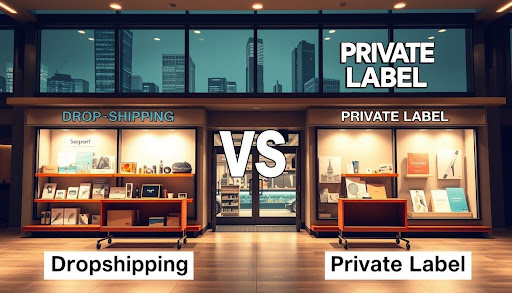Dropshipping vs. Private Label: Which Works Better?

Dropshipping vs. Private Label: Which Works Better?
Starting an online store can be exciting. But, it can also lead to a big decision. You might find out your business model doesn’t fit your goals. This is a common problem for many entrepreneurs.
They often face a choice: do you want easy order fulfillment or a unique brand? Dropshipping and private labeling are two popular options. They can change how you run your business every day and your future success.
MFG Merch, a company in Jacksonville, shows how private labeling can work. They make custom clothes that show off their clients’ brands. This is different from dropshipping, where sellers don’t handle the products.
Dropshipping is great for starting small and testing the market. Private labeling builds customer loyalty with custom products and quality control. One model is flexible, while the other focuses on owning your brand. Knowing these differences can help you avoid mistakes in the digital world.
Key Takeaways
- Dropshipping minimizes upfront costs but offers limited control over product quality.
- Private label businesses build brand equity through customized manufacturing.
- Inventory management differs significantly between the two models.
- Profit margins often favor private labeling for established businesses.
- Local partners like MFG Merch demonstrate private label success in specific markets.
Understanding Dropshipping
Dropshipping lets you start an online business without holding any inventory. You focus on marketing, and suppliers handle the rest. For instance, a fitness gear store can list products from different suppliers. They use Shopify to process orders and let manufacturers ship directly to customers.

What is Dropshipping?
Dropshipping is like a middleman system. Retailers work with suppliers who manage the stock and shipping. When a customer buys something, the supplier ships it from their warehouse. This way, you don’t have to buy a lot of products upfront. But, you have less control over how the products are packaged or how fast they are delivered.
Key Advantages of Dropshipping
Low startup costs make it easy to start. You don’t need to buy a lot of products or rent a warehouse. Other benefits include:
- Flexibility to test niche markets risk-free
- Scalability without logistical bottlenecks
- Automated order processing through integrations
Common Challenges in Dropshipping
Dropshipping is appealing but comes with challenges. Shipping times can be long, taking 2–4 weeks for overseas suppliers. This can upset customers. Also, profit margins are often lower than with private-label brands. Other issues include:
- Limited customization of products
- Supplier errors affecting your reputation
- Intense competition in popular niches
| Aspect | Pros | Cons |
| Startup Costs | Under $500 | Lower profit margins |
| Inventory Management | No storage needed | Supplier dependency |
| Brand Control | Quick market entry | Generic packaging |
| Scalability | Easy to expand | Shipping delays |
Exploring Private Labeling
Jacksonville apparel companies like MFG Merch show how private labeling makes products unique. They create custom items under their brand name. This method needs an initial investment but helps stand out in the market.

What is Private Labeling?
Private labeling means making products with third-party suppliers and selling them as your own. MFG Merch in Jacksonville helps make unique apparel with your logo. It’s great for local markets or specific groups.
Benefits of Private Labeling
Complete brand control is a big plus. Companies can:
- Design unique product lines
- Set high prices
- Keep customers loyal with consistent branding
MFG Merch clients see a 40% profit boost with private label items. They can also tweak quality during production.
Potential Drawbacks of Private Labeling
This strategy needs careful planning. Initial costs include:
| Expense Type | Average Cost | Risk Factor |
| Minimum Order Quantities | $2,000-$5,000 | High |
| Custom Packaging | $0.50-$2 per unit | Medium |
| Storage Fees | $100/month | Low |
Managing inventory and slower updates are challenges. This is different from dropshipping.
Key Differences Between Dropshipping and Private Label
The debate between dropshipping and private labeling is about control versus convenience. Both have their own ways to reach the market. But they differ a lot in inventory, branding, and initial costs. Let’s look at these differences to help entrepreneurs choose wisely.
Business Model Comparison
Dropshipping is a middleman system. Sellers sell products, and suppliers handle storage and shipping. This means zero inventory management but less quality control. Private labeling, on the other hand, lets businesses create or find unique products. This gives them full control from making to delivering.
| Aspect | Dropshipping | Private Label |
| Order Fulfillment | Supplier-managed | Self-managed or contracted |
| Inventory Risk | None | High |
| Supplier Relationships | Multiple third parties | Direct manufacturer partnerships |
Control Over Branding and Quality
Private labeling is great for customization. Businesses can make unique packaging and designs. They can also check quality closely. Dropshippers use generic branding, making it tough to keep customers loyal. Companies that make their own products often see 35% higher repeat purchase rates because of quality control.
Startup Costs Overview
Here’s where the models really differ:
- Dropshipping: $100-$500 initial investment (website + marketing)
- Private Label: $2,000-$10,000+ (product development + bulk orders)
Dropshipping needs less money upfront. But private labels can make more profit – 40-60% compared to 15-30% for dropshipped items. The downside is more inventory risk and longer setup times.
Target Audience and Market Analysis
Success in ecommerce starts with knowing exactly who your customers are and what makes them click. Whether you choose dropshipping or private labeling, your business thrives when you align products with real-world demand patterns. Let’s explore how to pinpoint opportunities in today’s competitive online retail landscape.

Identifying Your Niche Market
MFG Merch makes finding your niche easier with its screen printing services. They help brands find markets that need more. Their method includes three steps:
- Analyzing regional demand for custom apparel
- Tracking seasonal trends across U.S. demographics
- Identifying gaps in competitor offerings
For example, their 2023 data showed a 40% increase in eco-friendly workwear demand in the Pacific Northwest. This trend was missed by many. This detailed analysis helps businesses figure out which is more profitable in certain areas.
Understanding Customer Preferences
Phase 02 of MFG Merch’s consulting program dives into what buyers like. Recent studies found:
- 68% of online shoppers prefer unique designs over brand recognition
- Localized products sell 22% faster than generic ones
- Quality expectations change based on price (≤$25 vs. ≥$50 items)
These insights guide online retail strategies. They help businesses balance dropshipping ease with private label quality. By matching preferences with production, brands can make products that appeal more.
Remember: Profitability depends on matching your business model to what customers want. A yoga apparel brand used MFG Merch’s data to cut returns by 31%. They did this by changing fabric blends based on climate feedback from customers.
Inventory Management Strategies
Good inventory management is key for e-commerce success. It affects customer happiness, costs, and growth. Let’s look at how dropshipping and private labeling handle this important task.
How Dropshipping Handles Inventory
Dropshipping changes inventory management. You don’t store products. Instead, suppliers ship them directly to customers. This method offers:
- Zero storage costs: No need for warehouses or inventory tracking software
- Automatic stock updates: Suppliers manage product availability in real-time
- Scalable product ranges: Easily add new items without physical space constraints
But, it has downsides. Popular items can quickly sell out. This leaves you needing to update listings fast. MFG Merch’s Phase 04 helps with these issues by improving supplier communication and order tracking.
Private Labeling Inventory Considerations
Private labeling means you’re in charge. You must:
- Forecast demand accurately
- Manage bulk shipments from manufacturers
- Implement quality control checks
- Handle storage and fulfillment logistics
MFG Merch offers solutions for private label brands. It helps manage stock levels and cut costs. Unlike dropshipping, this method lets you:
- Customize packaging and branding at the storage stage
- Implement batch testing for product consistency
- Respond quickly to market trends with inventory adjustments
Dropshipping and private labeling need different strategies. Dropshipping is for those who want less work. Private labeling is for those who want full control over their brand.
Marketing Strategies for Both Models
Online retail needs different plans for dropshipping and private labeling. Both sell to the same people, but their marketing is different. This is because of how they handle stock, branding, and customer ties.
Effective Marketing for Dropshipping
Dropshipping is all about being quick. Since you don’t deal with products, focus on:
- Social media ads testing many products at once
- Working with influencers for trust
- Using retargeting ads to catch lost sales
MFG Merch clients see a 37% boost in sales with targeted ads. A seller in Florida got more sales by saying their products are “Jacksonville-approved” in local Facebook groups.
Marketing Approaches for Private Labeling
Private labeling is about telling your brand’s story. Good ways to do this include:
- Telling where your products come from (like a 1920s apothecary)
- Using Amazon Brand Registry tools
- Hosting events with free samples
Phase 05’s methods are great for this. A cosmetics brand grew 200% in a year by rewarding customers for sharing their own content.
| Strategy | Dropshipping | Private Label |
| Best Platform | Facebook/Instagram | Amazon/Shopify |
| Content Focus | Trend-driven posts | Brand heritage stories |
| Customer Retention | Email sequences | Loyalty programs |
Financial Considerations
Looking at the numbers shows us how profitable ecommerce can be. Dropshipping and private labeling both have their money-making sides. But, they need different plans for success. Let’s see what your wallet might see with each choice.
Profit Margins in Dropshipping
Dropshipping starts with low startup costs. But, it means smaller profit margins. Businesses usually see 15-20% margins after fees and marketing costs. A Phase 03 report says:
“Volume becomes your lifeline – you need 3x more sales than private labelers to match their profits.”
Three things make these margins tight:
- Supplier price markups (usually 30-50%)
- Competition that lowers prices
- No say in shipping costs
Phase 03 says businesses moving $50k/month often keep less than $7,500 profit.
Financial Outlook for Private Label Businesses
Private labeling needs more money upfront but pays off over time. MFG Merch’s prices show:
- $5k-$15k for initial product costs
- 40-60% gross margins after growing
- 5x more customer value than dropshipping
Brand value grows over time in private labeling. First-year profits might be lower than dropshipping. But, by year three, you could see 200-300% ROI through:
- Being able to charge more
- Getting repeat customers
- Wholesale deals
One MFG Merch client went from $80k to $1.2M in three years. They did this by using profits to make more products. This shows private labeling’s snowball effect – successful items help fund new ones, creating more income streams.
Scalability: Which Model Grows Better?
Scalability is key for a business to grow over time. Dropshipping and private labeling are two paths to growth. Let’s see how each model expands and which fits your goals better.
Scalability Potential of Dropshipping
Dropshipping starts with low upfront costs. It’s easy to test products and grow fast. Suppliers handle the inventory, so you don’t need a warehouse. But, growth relies on good partnerships.
Phase 06 shows how to scale by automating supplier work. This makes handling more orders easy.
Key advantages for scaling:
- No physical inventory constraints
- Rapid market testing with minimal risk
- Flexibility to pivot product offerings
Growth Opportunities with Private Label
Private labeling focuses on brand loyalty and control. Companies like MFG Merch use special production lines for quality. This model lets you create custom products, charge more, and keep customers coming back.
Starting with product development pays off as you sell more. This leads to better profits.
Critical growth drivers include:
- Exclusive branding opportunities
- Higher profit margins over time
- Ability to negotiate bulk manufacturing deals
| Factor | Dropshipping | Private Label |
| Startup Costs | $500–$2,000 | $5,000–$20,000+ |
| Inventory Control | Supplier-managed | Self-managed |
| Profit Margin Range | 15–30% | 40–60% |
| Brand Customization | Limited | Full control |
Dropshipping is fast, while private labeling builds value. Choose based on whether you want quick growth or a strong brand.
Legal and Regulatory Factors
Both dropshipping and private label businesses must follow legal rules. Each model has its own set of rules. Knowing these rules, like Florida’s product safety standards, can save you from big mistakes. Let’s look at the key points for each.
Compliance Requirements for Dropshipping
Dropshipping deals with sales across borders. This means dealing with laws from different places. For example, U.S. sellers must follow FTC rules on shipping and refunds, even if their suppliers are abroad.
Taxes also play a role. Sellers might need to collect sales tax in states where they meet certain economic thresholds.
International suppliers might not meet U.S. safety standards. This could put sellers at risk. A Florida dropshipper could face penalties if their supplier ships products that don’t meet the state’s Child Safety Law for toys. Checking supplier certifications regularly can help avoid these problems.
Regulations Involving Private Label Products
Private labeling gives more control but requires strict rules. For example, MFG Merch in Florida makes eco-friendly kitchenware. They follow:
- FDA food-contact material standards
- Florida’s Green Product Certification guidelines
- Federal Trade Commission labeling rules
MFG Merch also does third-party testing to meet Consumer Product Safety Commission standards. Unlike dropshipping, private label brands must get a sales tax permit from the state. They also need to make sure packaging has the right warnings, like California’s Prop 65 notices for sales across the country.
Knowing the pros and cons helps entrepreneurs pick the right model. Dropshipping makes starting easy, but private labeling needs more legal work for brand safety.
Final Thoughts: Choosing the Right System
Choosing between dropshipping and private labeling depends on your goals. Both ways have their own paths to market. But, they work best when they match your brand’s vision and resources.
Assessing Your Business Goals
Think about what you want. Do you want to grow fast with little cost, or build a loyal customer base? Dropshipping is good for quick growth. Private labeling helps build a strong brand.
MFG Merch says quality is key. Their Phase 01 helps you pick the right model. It’s about what you want to achieve, like easy logistics or unique products.
Making an Informed Decision
Do your homework. Look at the competition, profit margins, and what customers want. Dropshipping is for those who like working with suppliers. Private labeling means you’re more involved in making and branding.
If you’re in Jacksonville, MFG Merch can help. Call them at (904) 677-9505. They’ll guide you to choose wisely. Whether it’s dropshipping or private labeling, they help you grow efficiently.
FAQ
What is the main difference between dropshipping and private labeling?
Dropshipping means selling products without keeping them in stock. Suppliers send the products directly to customers. Private labeling means creating or rebranding products under your own brand. This requires upfront production and managing inventory.
Which business model has lower startup costs: dropshipping or private label?
Dropshipping has lower startup costs because you don’t need to buy inventory upfront. Private labeling needs money for product development, manufacturing, and buying lots of products.
How does private labeling offer better control over branding compared to dropshipping?
Private labeling lets you customize packaging, design, and product quality. This builds a unique brand identity. Dropshipping uses suppliers’ products, limiting your branding unless you use print-on-demand services like screen printing in Jacksonville, FL.
Which model is more profitable long-term: dropshipping or private label?
Private labeling can be more profitable over time because of brand loyalty and pricing control. Dropshipping has thinner margins but can grow quickly with little overhead.
How do inventory management strategies differ between the two models?
Dropshipping doesn’t need inventory management because suppliers handle it. Private labeling requires managing stock, warehousing, and shipping on your own.
Can dropshipping businesses build a loyal customer base like private labels?
It’s hard for dropshipping to build a loyal customer base because of limited product differences. Private labels do well with unique offerings and personalized branding, leading to stronger loyalty.
What marketing strategies work best for private label products?
Private labels do well with storytelling, social media, and influencer partnerships. Amazon FBA or Shopify are good for showing off branded products.
Are there compliance risks specific to dropshipping?
Yes. Dropshippers must check if suppliers meet safety and shipping rules. Private labels have stricter compliance, needing to handle product certifications, labeling, and liability.
Which model scales faster: dropshipping or private label?
Dropshipping scales quickly because of low costs and automation tools. Private labeling takes more time to grow but offers sustainable growth through brand equity.
How important is niche selection for both business models?
Very important. Dropshipping needs trending niches with reliable suppliers. Private labels do well in specialized markets where branding and quality matter, like organic skincare or eco-friendly apparel.
Can screen printing services in Jacksonville, FL, integrate with dropshipping?
Yes. Local screen printing services can work with dropshippers for custom apparel. This offers branded products without inventory risk through print-on-demand solutions.




